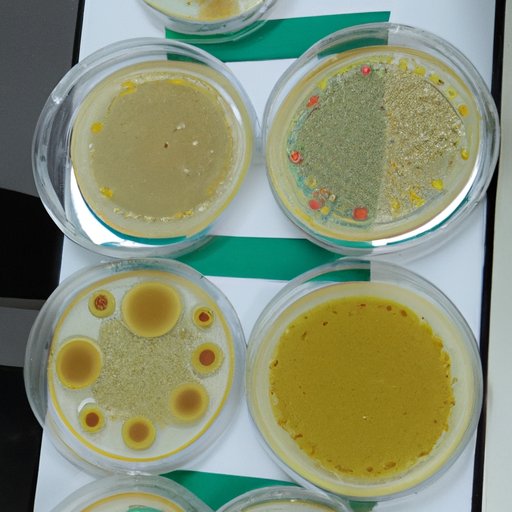Introduction
Bacterial culture is the process of growing bacteria in a controlled environment. It is an important tool used in medical, agricultural, and industrial settings to study, diagnose, and develop treatments for various diseases, as well as to produce useful products. In this article, we will explore what bacterial culture is, how to set up and maintain a bacterial culture, and the common applications of bacterial cultures.
How to Grow and Maintain a Bacterial Culture
The first step in setting up a bacterial culture is to select the appropriate medium for the bacteria. Common media used for bacterial cultures include agar, nutrient broth, and liquid media. After selecting the medium, the bacteria must be inoculated, or introduced, into the medium. This can be done by transferring a sample of the bacteria from another culture or by obtaining a pure culture of the desired bacteria.
Once the bacteria is added to the medium, the culture must be incubated in the proper environmental conditions. The temperature, pH, and oxygen levels must all be monitored and adjusted to ensure optimal growth of the bacteria. Additionally, the bacteria must be regularly monitored for any signs of contamination or mutation.
Common problems that may occur with bacterial cultures include contamination and mutation. Contamination occurs when other types of bacteria enter the culture and compete with the desired bacteria for resources. Mutation occurs when the bacteria suddenly changes its genetic makeup, which can lead to unexpected results. To prevent these issues, the culture should be maintained in a sterile environment and regularly monitored for any signs of contamination or mutation.

Common Applications for Bacteria Cultures
Bacterial cultures have many different applications in the medical, agricultural, and industrial fields. In the medical field, bacterial cultures are used to identify and diagnose infections, as well as to determine the effectiveness of treatments. In the agricultural field, bacterial cultures are used to create beneficial bacteria that can help plants to grow more effectively. In the industrial field, bacterial cultures are used to produce food, pharmaceuticals, and biodegradable plastics.
There are several different types of bacterial cultures that can be used depending on the application. For example, pure cultures contain only one type of bacteria, while mixed cultures contain multiple types of bacteria. Additionally, some cultures are designed to grow quickly, while others are designed to grow slowly over time. The type of culture used depends on the specific application.
Using bacterial cultures has many advantages. Bacterial cultures allow researchers to easily observe and manipulate the growth of bacteria, which can provide valuable insight into how bacteria interact with their environment. Additionally, bacterial cultures can be used to create large quantities of beneficial bacteria, which can be used for numerous applications.
Conclusion
In conclusion, a bacterial culture is the process of growing bacteria in a controlled environment. It is an important tool used in medical, agricultural, and industrial settings to study, diagnose, and develop treatments for various diseases, as well as to produce useful products. Setting up and maintaining a bacterial culture requires careful monitoring and manipulation of the environment to ensure optimal growth of the bacteria. Additionally, there are several different types of bacterial cultures that can be used depending on the application. Lastly, using bacterial cultures has many advantages, such as being able to easily observe and manipulate the growth of bacteria, as well as creating large quantities of beneficial bacteria.
We hope this article has provided you with a better understanding of what bacterial culture is and how it can be used. If you are interested in learning more about bacterial cultures, we recommend doing further research on the topic.
(Note: Is this article not meeting your expectations? Do you have knowledge or insights to share? Unlock new opportunities and expand your reach by joining our authors team. Click Registration to join us and share your expertise with our readers.)
